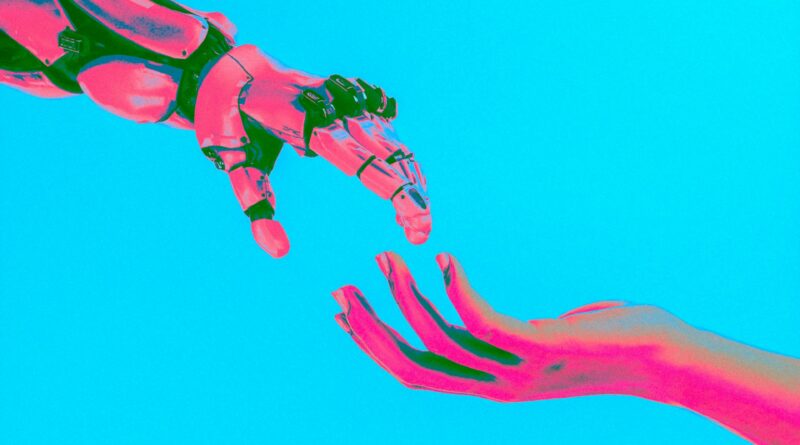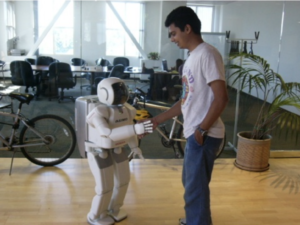What Does It Mean To Be Intelligent?
What Does It Mean To Be Intelligent?
Chirag Shah, University of Washington
In the summer of 2004, I interned at Honda Research Institute (HRI) in Mountain View, California. There, I worked on a robot named ASIMO. You can see a picture of me handshaking with ASIMO in our lab here. ASIMO was a humanoid robot – meant to look and act like a human. Of course, as you can see, it looks more like an astronaut than a typical human! But mind you, this was 2004 and the field of robotics was not nearly as advanced as it is today. Back then, this was state-of-the-art.
ASIMO could walk, shake hands, climb stairs, and even play soccer. The subsequent versions of ASIMO looked and acted more sophisticated than what you see here in the picture with me. Those versions could run, jump, and dance. They could converse in natural language and take commands. Even former US President Barack Obama played a little soccer with ASIMO during his visit to Japan.
Honda had a vision of making ASIMO so capable and inexpensive that every household can have one, much like Bill Gates’ vision of a PC per home. But we were nowhere close to that. The AI behind the robot was clunky, unreliable, and certainly not ready for a field test.
—What makes us intelligent, conscious, and human?—
Things have changed significantly since those days. While ASIMO is still a lab project, the AI behind the scenes has gone through leaps and bounds. In 2007, Steve Jobs convinced us to buy a small computer for our pocket, what he called iPhone. That shrunk to something that can be worn on your wrists some years later. In the early 2010s, we started having systems that could do translation and face recognition better than humans. Later in that decade, new kinds of machine learning algorithms gave rise to models that could process enormous amounts of data and extract knowledge from it to be able to answer all kinds of questions. In the early 2020s, generative AI programs became advanced enough to be able to create text, voice, images, and videos that are hard to distinguish from those created by humans.
We see a pattern here that’s only amplifying with time – computational systems that are starting to do many intellectual and cognitive tasks that traditionally humans have done, often surpassing them.
There is a scene in I, Robot where the protagonist (played by Will Smith), who is skeptical of the robots having any real ability to think or feel, challenges a robot that the robots are not anything like humans.
Smith: Can a robot write a symphony? Can a robot turn a canvas into a beautiful masterpiece?
Robot: Can you?
That’s almost like an “oh snap, he didn’t” kind of response from the robot! Sure enough, our protagonist doesn’t have a good comeback. If creating a symphony or painting a picture is what defines us, then those things are no longer unique to us.
In 2011, a robot named I-, designed by Japanese scientist Dr. Sachiko Kodama, composed the world’s first robot-written symphony. In 2018, an AI program created a canvas art titled “Edmond de Belamy”, which sold for $432,500 at Christie’s auction in New York.
In the meantime, most of us haven’t gotten any better at composing music or creating art that could sell for a price of a house.
So what does it mean? Have we stopped evolving while an artificial entity is making incredible progress in being more and more like humans?
I believe this calls for what we really think about being human, having a conscious, or possessing intelligence. Yes, the artificial entities are getting smarter, but I wouldn’t call it the same kind of smartness that defines us, the humans. Similarly, they are learning to act and think (and perhaps one day feel) like us, but those are all different kinds of acting, thinking, and feeling than humans. It’s like we are inventing an alien species right here on planet Earth. They may look and act like us, but they will still be aliens. They are not us. Don’t get me wrong, I’m not trying to be discriminatory here or against this newly discovered (developed?) species. I just don’t want us to lose our identity because we are too busy adoring them or fearing them.
There is no technical reason for a robot to look like humans. Bipedal mechanisms are not somehow better than quadrupedal systems. But we are obsessed with creating humanoids – robots that look like us, not because our physical design is perfect, but because we have a hard time seeing anything different; a different kind of species taking over the planet is scary for us. So we keep moulding these artificial systems in our form and liking, but let’s be clear – they are not us. They are super useful and we want/need them, but that’s no reason to give them more credit than they deserve.
We may not all have the ability to write a symphony or create a masterpiece of art, but those should not be requirements for being a human. They should certainly not be the only differentiating factors from AI. Let’s keep discovering what it is to be a human as we keep enhancing this new species we are creating.
Cite this article in APA as: Shah, C. What does it mean to be intelligent? (2024, January 24). Information Matters, Vol. 4, Issue 1. https://informationmatters.org/2024/01/what-does-it-mean-to-be-intelligent/







Sir It is very interesting post. I like that perspective to treat these humanoids as aliens. As we are humans and every human has something very unique but not everything. These humanoid are trying to accumulate all possible talent at one place. So my concern how to deal with this fear? What would be alternate way to make humans more relatable?
Thank you